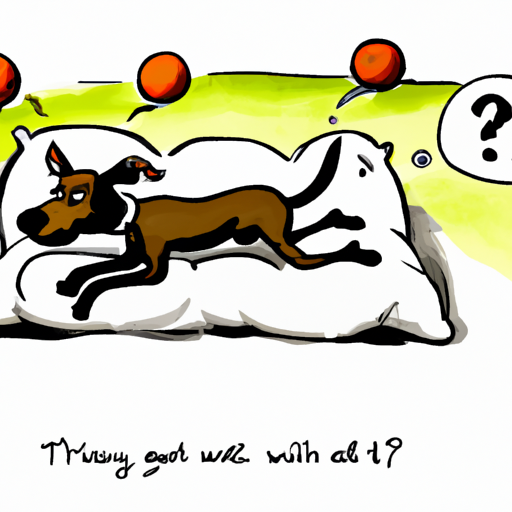For dog owners, observing the amusing antics of their furry friends is a source of endless joy. One such behavior that often perplexes us is when our pets twitch, kick, or even whimper in their sleep. Just like us, dogs have complex sleep cycles and their physical movements can provide intriguing insights into their dream world.
Table of Contents:
- Understanding Dog Sleep Patterns
- Why Do Dogs Kick in Their Sleep?
- Should You Be Worried?
- When to Consult a Vet
- Frequently Asked Questions
Key Takeaways:
- Dogs, like humans, undergo REM sleep during which they dream and exhibit physical movements.
- Normal kicking or twitching in sleep is not a cause for concern.
- Excessive movement, difficulty breathing, or signs of distress may indicate a health problem.
- Regular vet check-ups can help monitor and maintain your dog’s health.
Understanding Dog Sleep Patterns
Dogs experience two primary stages of sleep: Non-REM (NREM) and REM (Rapid Eye Movement). NREM sleep is a deep, restful stage, while REM is the stage during which dreaming occurs [^1^]. Just like in humans, a dog’s sleep cycle alternates between these stages, with REM sleep accounting for about 10-20% of their sleep time [^2^].
[^1^]: Dog Sleep Patterns
[^2^]: Sleep in Dogs
During REM sleep, your dog’s brain is highly active, processing the day’s events and storing memories. This is often when you will notice them kicking, twitching, or even barking in their sleep.
For further insights on your dog’s sleep patterns, OneTopDog offers a wealth of resources. For example, check out their articles on how much sleep dogs need and how to improve your dog’s sleep.
Why Do Dogs Kick in Their Sleep?
The primary reason dogs kick in their sleep is because they are dreaming. During REM sleep, your dog might be reliving their day—chasing squirrels, playing fetch, or going for a walk. Consequently, they may twitch, kick, or move their paws, emulating their daytime activities.
A fascinating study by Stanley Coren, a renowned dog behaviorist, revealed that dogs indeed do dream. His research demonstrated that small dogs dream more frequently than larger breeds—every ten minutes compared to every hour.
Should You Be Worried?
Generally, seeing your dog kick or twitch in their sleep is no cause for concern—it’s just part of their normal sleep cycle. However, it’s essential to watch out for any abnormal behaviors.
Excessive movement, difficulty breathing, or signs of distress may indicate a health problem such as a seizure or a condition known as REM Behavior Disorder. This disorder is characterized by dogs physically acting out their dreams, which can potentially lead to injuries.
When to Consult a Vet
While occasional kicking in sleep is standard, it’s crucial to consult your vet if you notice any unusual changes in your dog’s sleeping habits. This might include excessive twitching or movement, loud vocalizations, difficulty breathing, or signs of distress.
It’s always better to err on the side of caution when it comes to your pet’s health. Regular vet check-ups can help monitor your dog’s health and detect any potential issues early. OneTopDog also provides some valuable tips on how to prepare for a vet visit.
Frequently Asked Questions
- Why does my dog kick in his sleep?
Dogs kick in their sleep primarily because they are dreaming. During REM sleep, they might twitch, kick, or move their paws as they emulate their daytime activities in dreams.
- Should I be worried if my dog is kicking in his sleep?
Normal kicking or twitching in sleep is not a cause for concern. However, if you notice excessive movement, difficulty breathing, or signs of distress, it’s recommended to consult a vet.
- Do all dogs dream?
According to research, all dogs dream, but the frequency and duration of dreams can vary based on their size and age. Small dogs tend to dream more often than larger breeds.
In conclusion, your dog’s sleep habits offer a fascinating glimpse into their dream world. So, the next time you see your furry friend kicking or twitching in their sleep, they’re probably just off on another adventure in dreamland!



